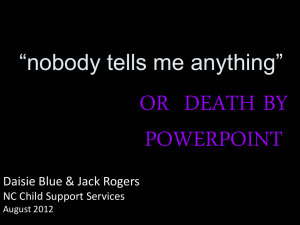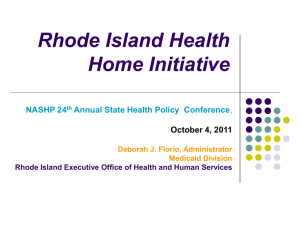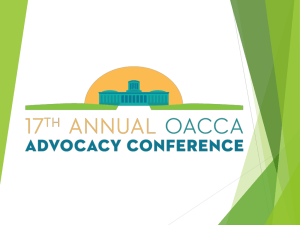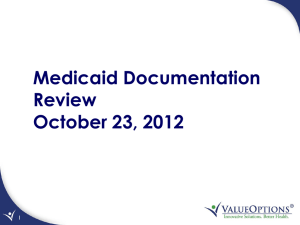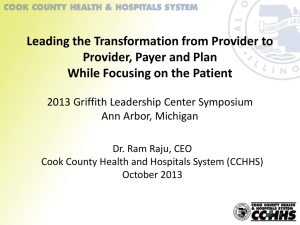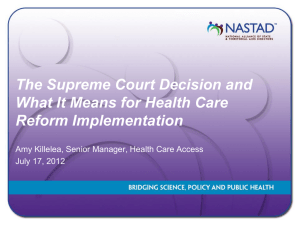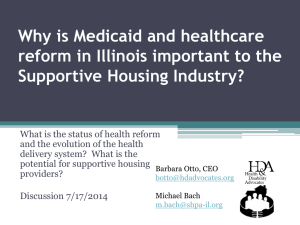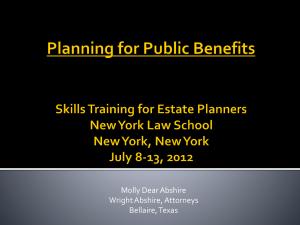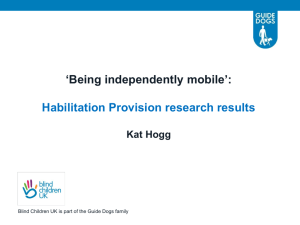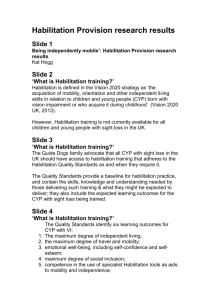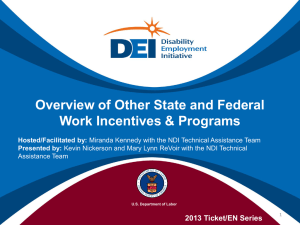Medicaid Waivers
advertisement
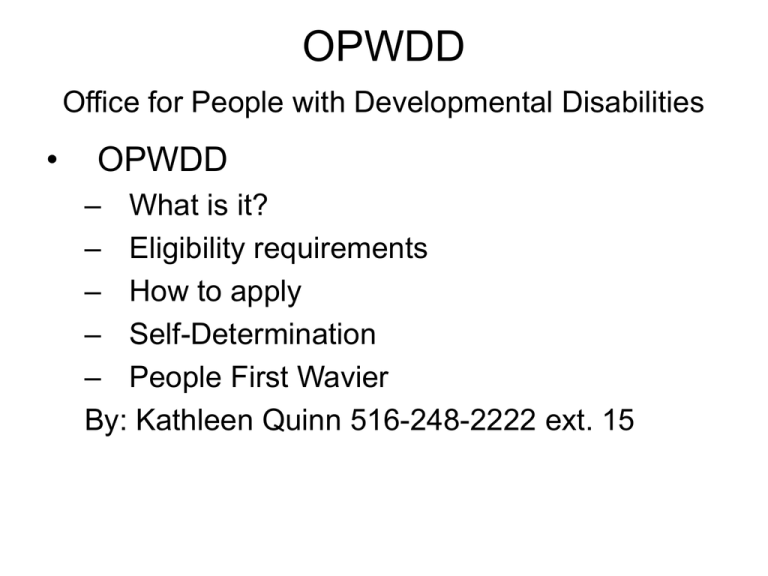
OPWDD Office for People with Developmental Disabilities • OPWDD – What is it? – Eligibility requirements – How to apply – Self-Determination – People First Wavier By: Kathleen Quinn 516-248-2222 ext. 15 FEGS Health and Human Services System’s FAIR Program Family Advocacy Information and Referral Program • What is FAIR? • What services does FAIR provide? • What are OPWDD’s Family Support Services (FSS)? • How can FAIR help you and your family? Stacey Astachovsky, MSW sastachovsky@fegs.org 516-496-7550, ext. 240 • 1) Supplemental Needs Trusts • • • • ▪ What are they and how do they work? ▪ Coordination with an estate plan ▪ Different types of supplemental needs trusts ▪ Strategies for funding the trusts • • 2) Government Benefits for a Disabled Individual • • ▪ SSI vs. SSDI – rules and eligibility ▪ Medicaid – why it is so important • • 3) Guardianship • • • ▪ What it is and why it’s needed ▪ SCPA 17A Guardianship ▪ Article 81 Guardianship F∙E∙G∙S Health and Human Services System Medicaid Overview • An insurance program funded by the federal and state governments for individuals who can not afford medical expenses based on their household income Eligibility OPWDD services funded by Medicaid Medicaid Buy-In program Jamel White, MSC Supervisor jwhite@fegs.org 631-691-7080 Ext. 312 4 Medicaid Waivers Overview • State authorization that waives Federal limitations and enables a specific class of people to receive services that Medicaid usually does not provide. Eligibility Examples of New York State Medicaid Waiver Programs • Lombardi – Medically fragile individuals • Traumatic Brain Injury (TBI) • Nursing Home Transition and Diversion (NHTD) • Care-At-Home • Home and Community Based Services (HCBS) • 1115 People First Waiver FEGS Health and Human Services System 5 Supplemental Security Income (SSI) Overview • Supplemental Security Income (SSI) is a Federal income supplement program funded by general tax revenues that helps aged, blind, and disabled people, who have little or no income by providing cash to meet basic needs for food, clothing, and shelter. • Administered by the Social Security Administrations Eligibility Application process - (paper or electronic) FEGS Health and Human Services System 6 Why do I need a Medicaid Service Coordinator (MSC)? By: Celeste Grant, MSC Sr. Program Mgr. Head Injury Association • Assists with obtaining & maintaining benefits (i.e. Medicaid, SSI) • Assists with application process for various programs (day habilitation, community habilitation, residential habilitation, supported employment, medical services, transportation services, recreational/respite, etc.) • Refers to various community resources (i.e. legal services for guardianship, SNTs) • Develops & maintains Individualized Service Plan (ISP) – prescription for services: reviewed/updated every 6 months; includes background information, valued outcomes, lists Medicaid & HCBS waiver services • Meets/contacts regularly with son/daughter to ensure all needs are being met • Advocates for son/daughter in order to help them to live productive lives in the community according to their own dreams & desires 7 Wavier Programs By: Alana de Sciora Residential Services • ICF- Intermediate Care Facilities • IRA- Supervised Individualized Residential Alternatives • SUPPORTIVE IRA- Supportive Individualized Residential Alternatives • ISS – Individualized Support Services Community Services • Community Habilitation • Hourly Respite Programs/ Recreational Respite Services • Overnight Respite Services • Crisis Residence • Mobile Crisis Services • 30 day Assessment House • Medicaid Service Coordination Day Services • Day Habilitation Sites • PWW( Program Without Walls) Community based day programs. • Traditional Day Programs • Supportive Employment ACCES by: Marlene Johnston ACCES-VR works with students, families and school districts to coordinate appropriate services for students with disabilities who are leaving secondary education and entering adult vocational rehabilitation and related services. These efforts are crucial to enable students to achieve maximum success in post-school activities consisting of integrated employment (including Transition services are a coordinated set of activities for secondary students with disabilities, designed to achieve specific outcomes, which promote movement from school to post-school activities. The coordinated set of activities is based upon the individual student's needs, taking into account the student's preferences, potential, abilities and interests. These activities include instruction, community experiences, the development of employment and other post-school adult living objectives, and, when appropriate, acquisition of daily living skills and functional vocational evaluation. The goal of transition services is not simply a referral to ACCES-VR, but rather post-secondary education, adult education and training, adult services, independent living, community participation, a specific job or career, and/or integrated community living. The goal of transition services is to ensure that students with disabilities are prepared for employment, post-secondary education, or community living when they leave school. As a participant in this process, the ACCES-VR counselor can: • Contribute knowledge of rehabilitation services and outcomes; • Identify the need for involvement by other state agencies, adult service programs, independent living centers and community based services whose resources can assist students with disabilities, their families and educational personnel during the transition planning and service delivery process; • Provide information to assist in the selection of suitable vocational goals that are consistent with labor market needs and integrated community living opportunities, including providing information about: work site accommodations; employer expectations; labor trends and occupational outlooks; job entry qualifications; job placement analysis; and other vocationalrelated issues. DAY HABILITATION WHEN TO START LOOKING In junior year attend as many open houses as you can WHAT TO LOOK FOR Evaluate your son's/daughter's capabilities Community vs center based program Level of assistance your child needs Staffing ratio and availability of clinical staff PAPERWORK REQUIREMENTS Completed agency or universal application with supporting documentation SCREENING PROCESS In person interview on site ASSESSMENT PROCESS Individual attends program for designated time and participates fully to determine if they are a good fit for the program • By: Florence Faga YAI - Long Island Employment Services By: Madeline Rosensweet • About YAI • Long Island Employment Services Programs – Pre-Vocational Services/Day Habilitation Without Walls – OPTS Vocational Program – Supported Employment – Eligibility – Contact Bonnie Holtzman, Program Supervisor, at (516) 338-9264 or email at bonnieholtzman@yai.org Special thanks to the committee that coordinated tonight’s event: Administration: John Felicciardi, Director of Special Education and Pupil Personnel, BMCHSD Ivy Cohen, District Chair of Special Education, BMCHSD David Seinfeld, Principal, Calhoun High School Emily Paluseo, Chairperson of Special Education, Calhoun High School SEPTA Committee: Jerry Clare, President Paula Stillwaggon, Secretary Ellen Carr Meryl Yoffe Ellen Proszak Michelle Walsh Alissa Blowers Melissa Joy Susan Astre Social Work Interns: Karen Yorio Lauren Eastman Secretarial Support: Patty McGrath Technical assistance: Paola LoPiccolo Custodial assistance Leonard Heide and staff Special thanks to the committee that coordinated tonight’s event: Special thanks to our Student Volunteers Erin Murphy Carly Schoenfeld Ashley Florscher Derek Ha Tomer Yoffe Maria Mazzeo Kevin Flay Justin Katzman Ricky Beneventano James Roeder Frank Badalamenti Nicholas Astre Student Photographer Vinny Ruvolo Ashley Gitlitz Special thanks to our Calhoun Clubs Express Yourself, Ms. Simson Prep Computer Club, Ms. Funk Ms. Blowers Prep Entrepreneur Club, Ms. Joy & Ms. Natof Daily Living Skills Class, Ms. Blowers

